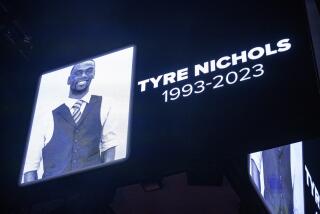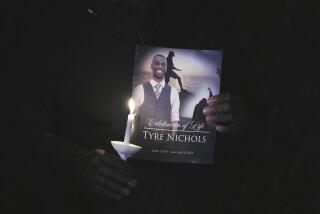McVeigh, Nichols to Be Tried Separately
- Share via
WASHINGTON — The judge in the Oklahoma City bombing case ordered separate trials Friday for Timothy J. McVeigh and Terry L. Nichols, basing his decision on a critical piece of government evidence against the two former Army buddies in the worst terrorist attack ever in the nation.
U.S. District Judge Richard P. Matsch said it would be unfair to McVeigh to try the defendants together because the jury in a joint trial would hear about statements Nichols made that deeply implicate McVeigh. Matsch had ruled earlier that the statements can be used against Nichols but not McVeigh--creating a conflict that can be resolved only by separating the trials.
The ruling--issued in Denver, where Matsch has transferred the case from Oklahoma City--was seen as another major setback for many of the thousands of victims and their families who believe the judge cares more for the rights of the defendants than those of the people who were injured or lost relatives in the April 1995 bombing of the Alfred P. Murrah Federal Building.
Although the judge did not set any trial dates, the now-separate case of United States vs. Timothy James McVeigh will go first, most likely sometime early next year.
“The court cannot save a joint trial by sacrificing the interests of one defendant to protect the other,” he said.
He added: “Each defendant is entitled to a jury’s separate and independent evaluation of the evidence received against him in any trial, regardless of the number of other persons alleged to have participated in the crimes charged.”
The decision to split the case into two trials, while extremely rare even in high-profile federal cases with multiple defendants, means that both defense teams and the government now must retool their strategies. All parties had been planning for a joint trial.
The judge cited a series of statements Nichols purportedly made to FBI agents in the nine hours after he surrendered in the bombing. In those statements, Nichols repeatedly implicates McVeigh and suggested that he was capable of delivering the ammonium nitrate-and-fertilizer bomb to downtown Oklahoma City.
The statements would prove dicey in a joint trial because the judge had ruled that prosecutors could use the FBI interviews as evidence against Nichols but not McVeigh.
The Nichols statements have never been released publicly. Transcripts of the interviews obtained by The Times show that Nichols first insisted McVeigh was not involved and then said it was possible he had been. Finally, he told agents that McVeigh could well have been the bomber and that he himself might have “accidentally” played a role as well.
*
Nichols also said that McVeigh had been in Oklahoma several days before the bombing and had predicted that “something big” was going to happen soon. He said McVeigh had told him: “I got something in the works.”
It remains unclear whether the Nichols’ statements are accurate, or whether he was simply trying to pass blame for the bombing. Matsch, however, said: “If these statements of Terry Nichols are taken as true, they tend to incriminate Timothy McVeigh.”
The judge also said “it must now be assumed” that Nichols will not testify at a joint trial. “Therefore,” he said in his ruling, “Timothy McVeigh’s lawyers will have no opportunity to cross-examine Terry Nichols about his statements.”
“In short,” he added, “Timothy McVeigh may be caught in cross-fire.”
Attorneys for both McVeigh and Nichols welcomed the opportunity to go to trial unencumbered by problems with their co-defendants.
Michael E. Tigar, the attorney for Nichols, said he will prepare some of his client’s defense by monitoring the McVeigh trial. “We won’t be absent from that trial,” he said.
Had the two men been tried together, Tigar said, “there would have been this risk of guilt by association, the risk that jurors would draw inferences from the fact that you had been friends and that you had been associated.”
He said a joint trial could have confused the jury if both defendants were blaming each other for the bombing. “In the separate trial of Terry Nichols, we intend to tell his story,” the lawyer said. “And that excludes finger-pointing.”
Stephen Jones, who represents McVeigh, said he expects his client’s trial to begin in March or April, and to last about three months.
He said the defense has won several crucial pretrial issues, including the appointment of a judge outside of Oklahoma and the move of the trial out of that state.
“The government resisted with all of its vigor and resources each of these motions,” he said. “But we were successful on each of them, and generally against accepted public wisdom from the legal and media community that we would not succeed on any of them. We now have set the stage for what we hope and believe will be a fair trial.”
Prosecutors, who had argued against separate trials, insisted that they are ready now to go to trial against McVeigh.
Larry A. Mackey, a special U.S. attorney assigned to the case, said the government team had planned to try McVeigh first if the cases were separated. “The grand jury that indicted them in the case identified Timothy McVeigh as the person who detonated the device in Oklahoma City,” he said.
Mackey also said that while Nichols’ attorneys will get a preview of the government’s evidence by watching the McVeigh trial, there are advantages for prosecutors as well. He said two trials allow the government to identify “strengths and weaknesses” of individual witnesses and pieces of evidence.
Legal experts said that while split trials are extremely rare, they can be necessary if there is evidence from one defendant that sharply damages another.
Many of the victims of the bombing, which killed 168 people and injured 850, were frustrated by the decision. They said they already faced the hardships of traveling to Denver, and now will have to do so for a second trial.
Jannie Coverdale, whose two grandsons were killed in the blast, said her family cannot afford the expense of trying to monitor two trials held in another state. “That’s going to put a hardship financially and emotionally on the family members and survivors,” she said.
Paul Heath, a Veterans Affairs Department psychologist who was injured in the bombing, said victims are feeling a range of emotions over the ruling.
“Some of us are feeling anger and questioning the judge’s decision,” said Heath, who is president of the OK City Murrah Building Survivors Assn. “Some of us are feeling further victimized that now it will take too long and it will be so expensive.”
More to Read
Sign up for Essential California
The most important California stories and recommendations in your inbox every morning.
You may occasionally receive promotional content from the Los Angeles Times.











